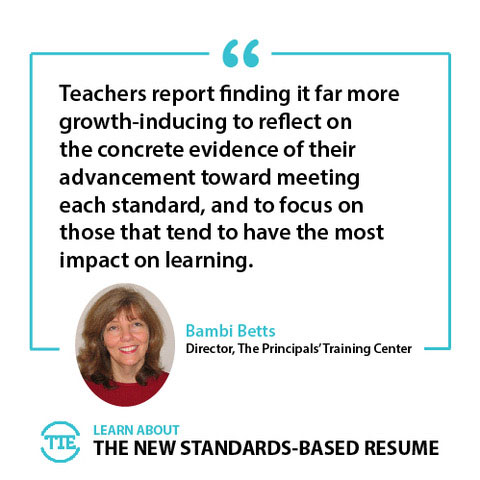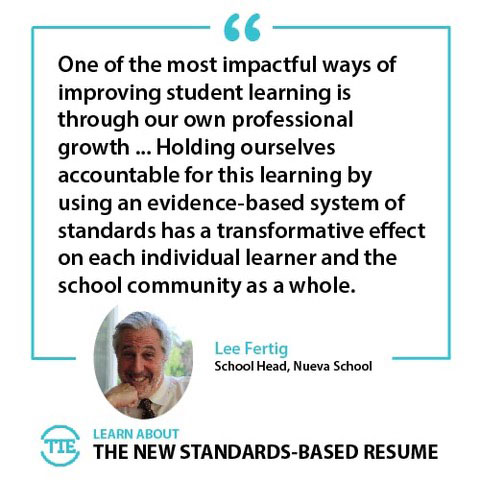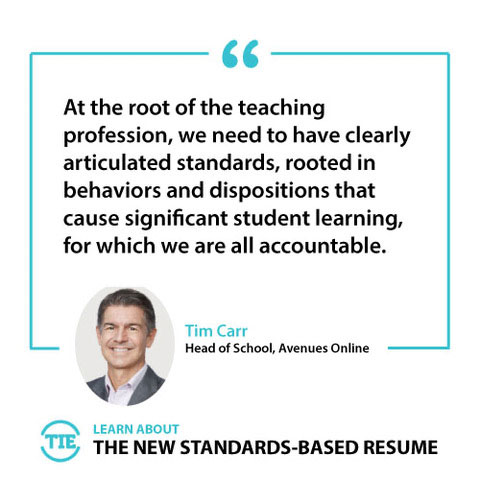As with all professions, standards of practice have been established to ensure children are getting the very best we know about effective teaching. The Standards of Practice for International Teachers incorporate these universal professional standards and extend them to include additional aspects of practice that are essential in the international school setting. These have been, and will continue to be, vetted by the international educational agencies below, and will be revised and refined as more input and perspectives are shared. The evidence you provide to support how you are reaching each standard forms the central part of the new TIE resume.
We invite you to look through the standard sets below.
Partners & Collaborators on the Standards of Practice for International Schools

Standards of Practice for the International Teacher
1. Effectively apply the most up-to-date, research-based strategies to address the needs of diverse learners.
2. Model the skills and attitudes of global citizenship, antiracism and intercultural sensitivity and proactivity.
3. Support learning in a culture of transition and mobility.
4. Collaborate positively with all members of the school community (student, colleagues, parents, leaders).
5. Meet the learning needs of learners with diverse language backgrounds in the mainstream classroom.
6. Skillfully and positively contribute to the curriculum development and monitoring processes.
7. Ensure that his/her work results in acceptable and measurable student progress.
8. Use the student assessment process to improve learning and teaching.
9. Think systematically, reflect on, and learn from practice.
Standards of Practice for International Teacher Leaders
1. Fosters collaborative culture in and between professional learning teams, with a focus on student learning, collegiality, trust and respect.
2. Model the skills and attitudes of global citizenship, antiracism and intercultural sensitivity and proactivity.
3. Develop, implement and monitor curriculum per the schoolwide curriculum design principles.
4. Design and facilitate team processes for the use of assessments and data to support student learning.
5. Share relevant research and models systematic inquiry, to improve teacher practice and student learning.
6. Design and lead job-embedded professional learning to facilitate improvement in instruction and student learning, aligned to school-wide and team goals.
7. Contribute to the school-wide program for teacher growth through observation, analysis of planning and student results, and constructive feedback.
Standards of Practice for International School Principal
1. Ensure your leadership results in student progress consistent with the school's mission and curricular goals.
2. Model the skills and attitudes of global citizenship, antiracism and intercultural sensitivity and proactivity.
3. Select, orient, assign, develop, evaluate, and retain quality instructional and support personnel to ensure every learner has access to effective teaching with particular attention to ensuring diversity.
4. Lead a curricular system based on the most recent understanding about learning, including developing, implementing and monitoring curriculum and learner progress.
5. Design, lead and manage the organizational plan, operations, and resources to provide a productive and accountable environment for learning.
6. Foster a climate and culture permeated by the notion that learning is always the lens through which we judge effectiveness; that relationships matter; that international-mindedness is fundamental.
7. Lead and interact with all members of the school community in ways which demonstrate a knowledge of and sensitivity to the culture of transition and mobility characteristic of international schools.
Standards of Practice for International School Counselors
1. Establish helping relationships with a community of diverse students.
2. Model the skills and attitudes of a global citizen, including: cultural sensitivity, antiracism, positive attitude, empathy and proactivity.
3. Create and implement features which support students in a culture of transition and mobility
4. Facilitate communication among students, parents and teachers.
5. Foster intercultural communication within the school community.
6. Apply relevant and appropriate ethics, laws and standards of professional practice to an international school context.
7. Advocate for students and families.
8. Collate and conduct research in the field and utilize it to continuously improve support programs.
General Standards of Practice for Systems Roles
1. Design and lead processes and services that demonstrate that the ultimate outcome is promotion of the school's mission.
2. Model the skills and attitudes of global citizenship, antiracism and intercultural sensitivity and proactivity.
3. Manage and monitor the day to day delivery of services.
4. Ensure processes and services are reflective of the most current research and thinking.
5. Systematically reflect on and learn from practice.
6. Conduct all aspects of your role in ways which demonstrate a knowledge of and sensitivity to the culture of transition and mobility characteristic of international schools.
7. Collaborate positively with all members of the school community (student, colleagues, parents, leaders).
AISH Standards for International School Heads
1. Lead with a mission and vision that focuses on the desired results for student learning.
2. In partnership with the governing body, develop a culture of responsibility and accountability for the fulfillment of the school's mission.
3. Enact legal and ethical practices to safeguard students' well-being and set high levels of performance in staff so that each student can attain academic success.
4. Ensure a safe, secure and supportive environment that is strategically resourced to achieve the mission and vision.
5. Cultivate positive relationships with families and the community to achieve partnerships that will benefit student outcomes.
6. Model behavior consistent with the school's values and continuously improve to meet the challenges and opportunities of leading a high-performing school.
Standards of Practice for International Teacher Leaders of Multilingual Learners
1. Effectively apply the most up-to-date, research-based strategies to scaffold the content and language integrated learning experiences of multilingual learners.
2. Model the skills and attitudes of global citizenship, multilingualism, antiracism, and intercultural sensitivity and proactivity.
3. Support learning in a culture of transition and mobility.
4. Collaborate positively with all members of the school community (students, colleagues, parents, leaders).
5. Collaboratively plan, implement, and assess interdisciplinary literacies with primary classroom teachers or secondary subject-specific teachers for multilingual learners enrolled in international schools.
6. Skillfully and positively contribute to the curriculum development and monitoring processes.
7. Ensure that his/her work results in acceptable and measurable multilingual learners' progress.
8. Use the student assessment process to improve learning and teaching.
9. Think systematically, reflect on, and learn from practice.



